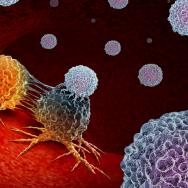About half of Prof. Stacy Lindau’s patients over the last decade have had breast cancer and express new difficulties with sexual function during and after treatment. That’s now several hundreds of women.
“One of the common problems women complain of is the loss of sensation in their breast after mastectomy with reconstruction,” or even after just a lumpectomy, said Lindau, a leading University of Chicago professor of obstetrics and gynecology. “In the U.S. alone, 100,000 women a year have one or both breasts removed. That’s a lot of women losing an important body part.”
Lindau set out looking for evidenced-based solutions to these problems and came up empty-handed. So she’s now leading the Bionic Breast Project, an interdisciplinary research program at UChicago applying bionic technologies to restore post-mastectomy breast function.
“It was with these observations and substantial suffering among my patients that I went looking for a solution to the problem of lost sensation and more generally, loss of function in the female breast in the context of breast cancer,” Lindau said.
In looking for answers, she came across media stories about successes with penile transplants. What struck her about this coverage was the rarity of the conditions that would warrant this transplant, in relation to the significant investment that has been made in restoring penile function. Additionally, Lindau said she was given hope by the fact that the success of these procedures was being judged not just by the cosmetic appearance, but also by three aspects of penile function: urinary, sexual and reproductive function.
Advances in bionics emerged as a good place to look, and Lindau quickly connected with Prof. Sliman Bensmaia, a renowned neuroscientist who studies sensory information in the nervous system and the brain; he previously developed a robotic arm that allowed a paralyzed man to control the arm with his brain and feel the sensation of touch.
Bensmaia, the James and Karen Frank Family Professor of Organismal Biology and Anatomy, said the project dovetails nicely with his previous work, but the target population is much larger.
Using some of the concepts developed for the bionic hand, the researchers plan to embed a flexible sensor array under the skin of mastectomy patients. Activated any time the nipple-areolar complex is touched, the sensor array sends signals to a series of electrodes that stimulate the patient’s residual intercostal nerves—nerves that used to interface with the breast.
“You can create vivid sensations of touch by electrically activating the nerves of the hand,” explained Bensmaia, noting that the Bionic Breast will foster re-embodiment of the patient’s chest. “It can feel like a part of their body again,” he said.
The work is backed by the National Cancer Institute R21 grant mechanism, which is intended to encourage exploratory research and gives the researchers two years to establish a working relationship and do the foundational and development work needed to warrant a longer-term, larger-scale investment.
As part of this, the researchers also are collating a list of subjective and objective criteria by which to measure breast function. “If we want to study the relationship between breast cancer treatment and breast function, we need a measure to assess breast function—and that did not exist,” said Lindau, whose lab is leading this work with input from a patient advisory board that has been helping define the right questions to ask and the right people with which to collaborate.
While Lindau’s team is well on its way to developing a measure that can also be used by others, Bensmaia is in parallel conducting the physical testing to quantify breast sensation. His team has developed a rig that enables the researchers to precisely quantify sensory perception in the breast—an adaptation of one used in their work studying hand sensation.
Testing the sensor technology subcutaneously for an extended period of time is the last technology development piece left to complete. Sihong Wang, an assistant professor at the UChicago Pritzker School of Molecular Engineering, is developing the tissue-like pressure sensors that can be structurally and functionally integrated into the Bionic Breast.
“Such sensors can work similarly as the sensing receptors in the breast for sensing physical contact/movement, by converting it to an electrical signal,” Wang said. “Our major steps are to build such sensors with tissue-like soft materials that are biocompatible for implantation, and to use the electrical signal to communicate with the artificial peripheral neural devices that Sliman will build.”
Mastectomy and reconstruction often happen in multiple stages, during which the researchers can implement the sensor array, giving them the opportunity to prototype without subjecting patients to additional surgeries. “It’s much less invasive than bionic hands, which require a special surgery to make that work,” Bensmaia said.
The researchers also plan to apply for an additional grant, which will help lay the foundation for studies in animal models and humans.
“This has the clearest path forward in just about anything I’ve ever done. All the components are in place,” Bensmaia said. “I am very confident this is going to work and help millions of women around the world.”
The researchers worked with the Polsky Center to file a patent application for the technology.
Citation: “Using Bionics to Restore Sensation to Reconstructed Breasts.” Lindau and Bensmaia, Frontiers in Neurorobotics, May 8, 2020.
Funding: National Cancer Institute, Janet D. Rowley Discovery Fund at the University of Chicago Comprehensive Cancer Center.
—Adapted from an article originally posted by the Polsky Center.

